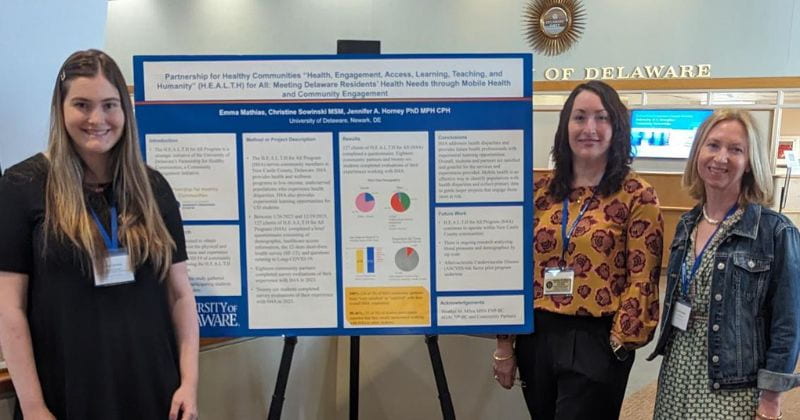Graduate research assistant connects with the community through mobile health

Emma Mathias once planned to become a nurse.
However, while working on virtual clinics during the height of the COVID-19 pandemic, she recognized that she wasn’t cut out for what she considered “high stress emergency situations.”
Instead, Mathias discovered a passion for working with systemic, upstream conditions–like access to quality health care–that can impact individual illness and health emergencies.
After graduating from the University of Delaware with an undergraduate degree in Health Behavior Science, Mathias was accepted into UD’s master in Public Health – Epidemiology program in the College of Health Sciences and joined the HEALTH for All (H4A) team as the graduate research assistant.
Established in 2020 from an earlier pilot, H4A is an initiative of the Partnership for Healthy Communities that brings mobile physical and behavioral health initiatives and education–among other services–to Delaware’s underserved populations.
Two days a week for nearly the past two years, Mathias, H4A Program Manager Christine Sowinski and Family Nurse Practitioner Heather Milea packed into a mobile health van to visit community sites in New Castle County.

“It’s been nice to become a familiar face and have people recognize me,” said Mathias, “to meet people of all different walks of life and to realize how much we have in common.”
Connecting with Delawareans at senior centers, churches and community centers, Mathias conducted a survey that scores participants on a range of mental and physical health criteria.
Mathias then compared the scores to a national average and mapped them by zip code to illustrate the difference in health outcomes across communities.
At times, conducting face-to-face interviews was challenging for Mathias, who describes herself as socially anxious. She found, though, that people are “happy to talk about themselves for a few minutes,” and she believes that pushing through her discomfort helped her make more meaning of the work.
“I have hundreds of data points, and I’ve sat and looked every single one of the people in the eye,” Mathias said. “I look back at the data I’m like, ‘Oh, I remember that person.’ That’s important, especially for people who work with data. It can be easy to separate the number from the human being.”
“Emma has been a valued member of our team,” said Sowinski. “She goes beyond her job description in service to the community, and her reports have been an integral part of reporting to our funders so that we can continue the work of H4A.”
Originally published on the Partnership for Healthy Communities website.
